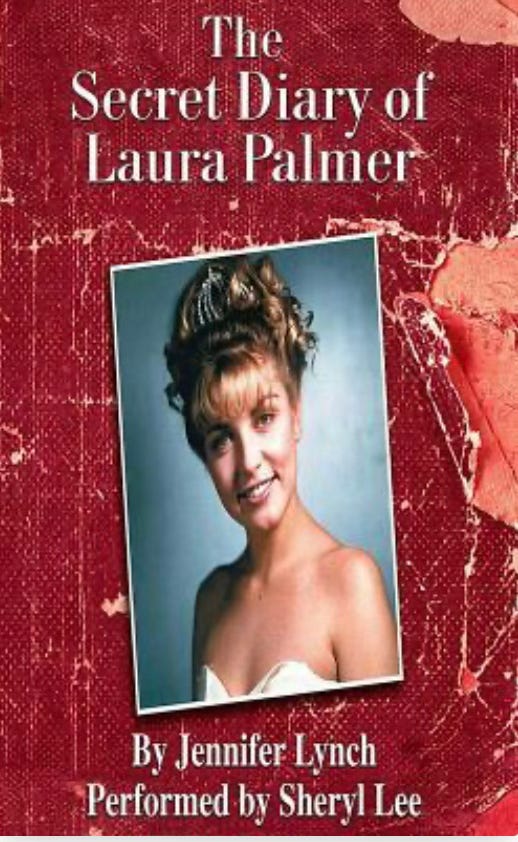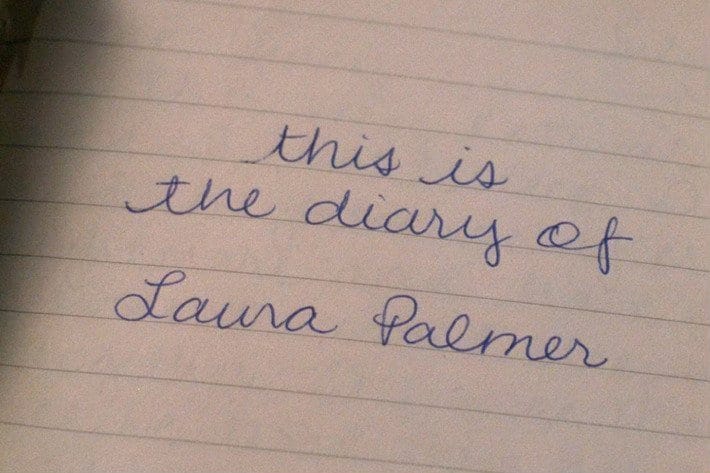I am the greatest of fools, a deficit in the cycle of life.
—Laura Palmer in her diary, January 7, 1988
Review:
Plot- or character-driven? A mix
Strong character development? Yes
Loveable characters? It's complicated
Diverse cast of characters? Yes
Flaws of characters a main focus? Yes
5 stars
I first read my paper copy of this book in my early 30’s, in a literal fever dream. I read in one sitting during a wretched flu, with a fever that told me the living room curtains were moving in and out. Either the entirely right or the entirely wrong way to read it, because I was high right along with Laura.
I watched Twin Peaks when it first aired and I was the same age as Laura and her friends (“friends”?), in 1989-1990. I rewatched it this year “on time”, watching Fire Walk with Me first (the Philip Jeffries day occurs on my birthday, February 16, then Dale Cooper enters the town on February 24, and dates are given rather regularly throughout the first two seasons into March). I just finished season 3, The Return, and the implications of the last moment have been haunting me all day.
Beyond my intense memory of that fever dream with Laura, I only took this novel in as a horror novel, even being a CPTSD fighter. But this time, I allowed myself to have a much more intimate, one-on-one journey with Jennifer Lynch’s backstory to her father’s work, because I listened to the audiobook, narrated by the Laura Palmer actress herself, Sheryl Lee. I had to take so many breaks. I cried several times. It was a combination of knowing how it all ends now, and how it began, and hearing Laura’s voice telling her own story of being alone while being bombarded by company in all kinds of ways…
All I have left to watch is The Missing Pieces and the original pilot. I might rewatch Fire Walk with Me again, now that I have seen The Return. Then I will read Mark Frost’s books. I listened to David Lynch’s audiobook of Catching the Big Fish, and thoroughly enjoyed it.
Part 8 of The Return is the most Lynchian thing I have ever seen, and it ties directly back into BOB and Laura. It could almost stand alone as a short film; I highly recommend it.
There’s so much more to all this—I am working on a podcast episode.
But just a note about this novel: Twin Peaks is all about the best and worst in people, and what brings them out. There is animal death and animal cruelty in this novel, and Laura is involved. Also, you know the phrase “hurt people hurt people”? That as well. If you only wish to see her as acting out through cheating, promiscuity, and drug abuse, this book is not for you. The animal scenes are brief, but she returns to what she did with regret, so they come back up.
I could go on and on, but I am saving more thoughts about this universe, created by David Lynch and Mark Frost, and expanded here by David’s daughter, Jennifer, for a podcast episode, looking at the themes of autism coding, the nature of time, trauma, and identity. Rabbit hole a go-go.
My life is whatever the other person in the room wants it to be. Therefore, when I am alone, my life is nothing.
—Laura Palmer in her diary, August 31, 1988, the day she started a second, “acceptable” teenage girl diary in case of discovery
the book’s page at the Twin Peaks wiki: July, 1983-February,1989 (spoilers afoot)







